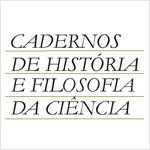Série 3 v. 15 n. 1 • Cadernos de História e Filosofia da Ciência
Autor: José Oscar de Almeida Marques
Resumo:
he existence of evil seems to imply, according to the old Epicurean dilemma, that God cannot be both benevolent and omnipotent, and the search for the tortuous paths of Providence tends to become particularly urgent in the wake of great disasters. Voltaire’s Poème sur le désastre de Lisbonne, and Rousseau’s Lettre à Monsieur de Voltaire are two important attempts to provide philosophical answers to the questions raised by the great Lisbon earthquake of 1755. Voltaire’s alternative is simply to refuse the optimistic “all is well” philosophy of Leibniz and Pope, and proclaim that genuine and not only apparent evil is indeed loose on Earth. Rousseau undertakes the more arduous task of defending Providence, and manages to present some original considerations based on the idea of human responsibility in the disaster. In spite of a seemingly clear-cut opposition between the two authors, I hope to show in this paper that their disagreement is not so radical as it might seem, and that both are more interested in the practical consequences of their interpretations than in a dry re-enactment of old metaphysical and theological discussions.
Texto Completo: https://www.cle.unicamp.br/eprints/index.php/cadernos/article/view/610
Palavras-Chave: Providence,Lisbon Earthquaken, Rousseau, Volt

Cadernos de História e Filosofia da Ciência
Os Cadernos de História e Filosofia da Ciência dirigem-se especialmente ao público interessado nas áreas de Epistemologia, Filosofia da Ciência, Teoria do Conhecimento e História das Ciências. Têm por objetivo central a publicação de artigos e notas originais de pesquisadores nacionais e estrangeiros, traduções de textos concernentes aos temas mais centrais da reflexão filosófica, metodológica e histórica sobre a ciência, e traduções comentadas de textos marcantes do desenrolar histórico dessa reflexão, bem como resenhas nas áreas do conhecimento em que os Cadernos atuam.
